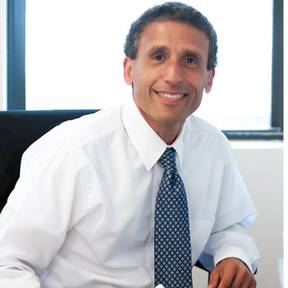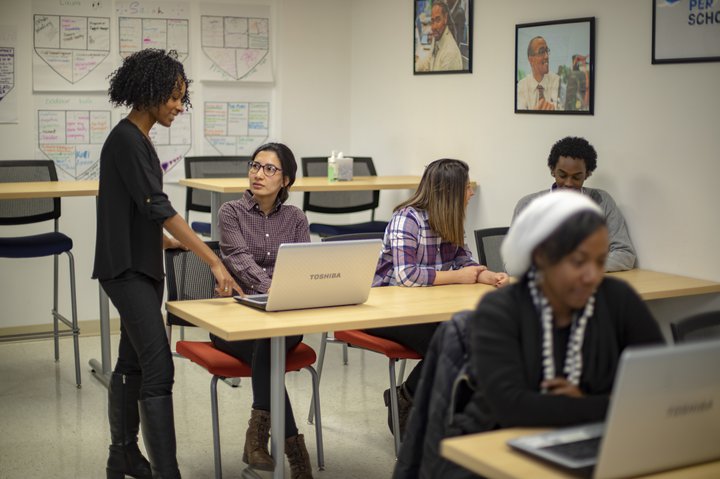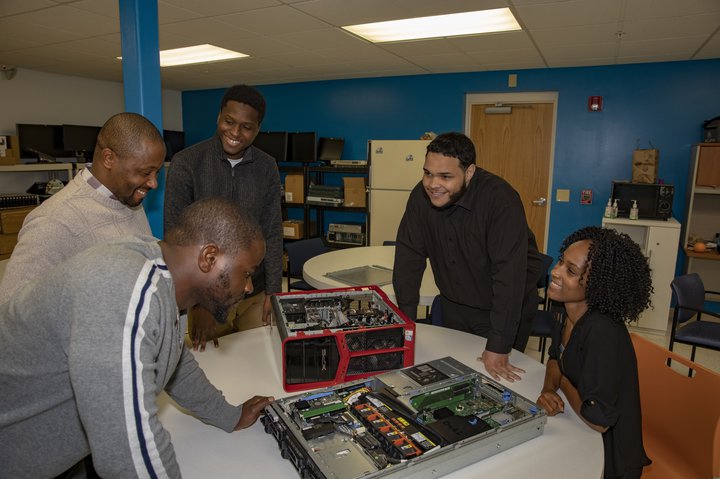In December 2020, premier technology workforce development organization Per Scholas was announced as the awardee of the $10 million Economic Opportunity Challenge. Their “Proven Pathways to Transformative Careers in Tech” project will improve economic opportunities for low-income individuals within the United States.

Per Scholas is now a member of Lever for Change’s Bold Solutions Network, which seeks to match nonprofits and social enterprises—whose solutions to significant social challenges were highly ranked after rigorous evaluation in one of the Lever for Change competitions—with additional donors and funding.
Almost one year has passed since Per Scholas was announced as the awardee for the Economic Opportunity Challenge, so Lever for Change caught up with Plinio Ayala, President and CEO of Per Scholas, for an update on his team’s progress since receiving the award.
The responses to interview questions below have been edited for clarity and concision.
Lever for Change: Per Scholas stands out as an organization with a story to tell. With regard to the Economic Opportunity Challenge, what are some key moments that you would be willing to share?
Plinio Ayala: In early 2019, we had just finished a second randomized controlled trial, and the results were amazing. The impact we were showing for those individuals who went through our training was significantly higher than those that did not in almost every category. And we were struggling as an organization with this question: how do we take advantage of the fact that we are having such huge impact and serve more people?
We had a plan that contemplated modest growth and eventually would have gotten us to a couple of thousand people served per year. The process of going through the Economic Opportunity Challenge with Lever for Change gave us the opportunity to think differently about scale and really challenged us to test all of our assumptions. This grant really catapulted us into a pretty significant path of scale and growth that I do not think would have happened without this incredible award.
"As we continue to think very boldly about growth, there will be additional investments that will come our way because of this grant."
Plinio Ayala
Since you were selected as the awardee of the Economic Opportunity Challenge, what benefits have surfaced that you may not have otherwise encountered?
Being an awardee put a pretty bright spotlight on Per Scholas, which created an opportunity for other funders to recognize us. This was a unique moment in time, in our history, to really think differently about serving more people. It allowed us to be able to leverage this funding to access additional capital. For example, we received an award from The Studio at Blue Meridian that bolstered the funding we got from the Economic Opportunity Challenge. As we continue to think very boldly about growth, there will be additional investments that will come our way because of this grant, which I cannot overemphasize. At the end of the day, it is about the people we serve, and our objective is to get as many Americans as possible, particularly people of color, into good paying jobs all over the country.

It has been one year since you applied for the Challenge. Reflecting on the past year, what have you accomplished and learned?
We could have been paralyzed by the moment. Instead, we began to invest and grow virtual training based on early learnings. In late 2019, we were building infrastructure capacity and training staff, and we began 2020 by piloting a couple of virtual training models. In fact, we were streaming concepts taught in the Bronx, New York to learners in Dallas, and we needed to be incredibly flexible and nimble. We pivoted our entire operation from what has been an in-person model to a now-virtual one and thankfully, we have done a magnificent job and continue to learn. We are really good at it now –way better than when we first pivoted in March of 2020.
But we have also learned that, as an organization, we cannot have virtual learning replace our in-classroom operations. There is a segment of the market that absolutely needs that high-touch experience and needs to come into a classroom. There is this other segment of the market that could absolutely benefit from a remote training hybrid. Now, this is an opportunity for us to scale in a very different way that we had not enacted prior to the pandemic. We will continue to leverage the hybrid model as a new channel for scale and will continue to use the Economic Opportunity Challenge funding to be able to experiment with additional new models that can really catapult the service levels in future years.
"Per Scholas gave me a restart in life and it allowed me to rebuild that confidence and enter a field where I can make a competitive income to sustain myself."
Jarred Gaines, Per Scholas Graduate
How do you make the virtual experience like the classroom experience for your learners?
We use data and feedback from our students to help make changes to the model. One of the biggest pieces that we are in the middle of developing based on all that input is creating the right assessment tools to determine which is the best opportunity: is someone going to do better in a classroom or virtual set-up? We have built a national remote training team whose sole purpose is to do virtual training, trying to mirror as much of the culture of the in-person experiences as possible.
For example, in the first week of the in-classroom training, a learner would take apart a computer and put it back together. We deploy these little microcomputers to our remote students, and they take it apart and put it back together virtually. A lot of the modules that we do in the classroom we have done a pretty good job of replicating virtually to simulate as much of the same in-person experience. There is still a lot of work to be done, but I think we are getting much, much better, as time goes on.
What makes us better at doing this, is adopting this mindset of lean testing. We make adjustments and evaluate them quickly. If it does not work, make a change to that adjustment – and if that does not work, then punt it and do something different. The idea is to do it in a way where it does not cost the organization a lot of money. So, we built an internal innovation team focusing solely on doing these tests across all our markets to determine what is the most efficient way, assessing what the changes we need to make based on input we are getting from our students. It is all in the data. The data does not lie. Determining how many people will be graduating, what are the jobs that they were getting – all that helps inform how we make changes to it.

Often organizations learn more from challenges they must overcome than from their successes—what challenges have you faced over the past year since receiving a large grant?
We had to learn to be incredibly nimble and recognize that not everything we design is going to work out the way we initially thought. And certainly, the pandemic threw us a major curveball, but there were other things that came about that we had to resolve quickly. For example, the digital divide in many communities is extremely apparent. So, there were several of our learners that did not have equipment at home – no reliable internet, Wi-Fi modules or computers.
We had to immediately get them what they needed to be able to finish the program. Now that has become part of what we provide learners who need it. That was a big “Aha!” moment for us because our enrollment numbers and completion numbers would dip significantly if we had not been nimble enough to make that adjustment. You know, not every model, not every plan goes to perfection, and we must adjust as we go along.
"We need more organizations to think differently, to take a chance, and to try and solve some of these issues and systematic barriers to people that we serve."
Plinio Ayala
What words of wisdom would you offer to teams who are just starting out in the application process for a competition or who hesitate to apply?
I am often asked, “What keeps you up at night?” A lot of things keep me up at night, but in this role, it is about recognizing that tomorrow morning millions of Americans across this country, in particular people of color, are going to wake up searching for that one opportunity that could change everything. And most of those individuals will go to bed without having found it.
There is a need to figure out ways of doing more, because the people that we serve deserve that. A piece of advice I would give to someone looking to apply is that if they believe that their model can have impact and additional investment would allow them to grow and to serve more people, this is the time to do it. Tough situations require bold solutions and, frankly, if we are not bold, there will not even be an even, equitable recovery – let’s face it. We need more organizations to think differently, to take a chance, and to try and solve some of these issues and systematic barriers to people that we serve.
What is your favorite aspect of being a member of the Bold Solutions Network?
I often say that being a nonprofit leader is incredibly lonely. There are not networks of like-minded leaders that you can talk to or learn from. The Bold Solutions Network provides something incredibly important to me: the ability to share best practices and to innovate with individuals that are like minded. We also have access to a number of pro bono organizational development opportunities, which has allowed us to continue to build our talent internally so that we can deliver on the promises we have made.
Lastly, one of the other benefits has been markets coming to us saying, “Hey, would you come to our city to serve to serve our community?” This is a big flip from before, when we had to search for these cities. Now, they are coming to us!
What is on the horizon for Per Scholas, now?
We took the plan we wrote for Lever for Change, and we added a remote component, which we are learning to do better and better. We are going to challenge ourselves to get to 10,000 Americans trained annually by 2025. If we are able to get to 10,000 by 2025, we will try to reach another 10,000 by 2030, because I think we can really change the face of technology. We can really provide access to good paying jobs to as many people as we can, if we can figure out how to reach the first 10,000. We are pushing ourselves to do more in a responsible way, recognizing that now is the time to do it.
"Per Scholas provided really amazing resources for people that might not have otherwise been able to have an opportunity like this."
Jadah Stone, Per Scholas Graduate
What does the work entail for you to get to 10,000 Americans served by 2025?
There are variations of virtual training that we will experiment with over the next year or two, and there is no doubt that we are going to hit on one or two that make a lot of sense for us to scale. Come December 31, 2025 we will have trained 5,000 people in classrooms in 25 cities and 5,000 people virtually across the country. If we can perfect the virtual training, it does not really matter where a learner sits to take the training, as long as we can find them a job in that particular community. We work with our employer partners to be able to provide that opportunity. As we continue the virtual training, we will be able to think broader and bigger.
***
Lever for Change is thrilled to see the progress Per Scholas has made in the past year. From adapting their program to reach people virtually to finding innovative ways to make the virtual experience just as impactful as in-person trainings – the Per Scholas team has shown that thinking big and bold and adopting a growth mindset pays off. We’re excited to see what’s in store for Per Scholas and their students in the next year and beyond! Read stories from Per Scholas graduates to see how they have used their training and found success.
Interested in learning more about Per Scholas and other Bold Solutions Network members? Sign up for our newsletter to get the latest updates right in your inbox.